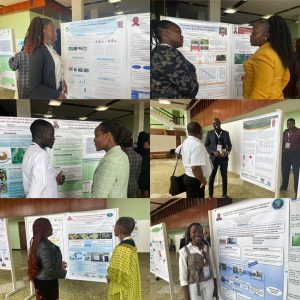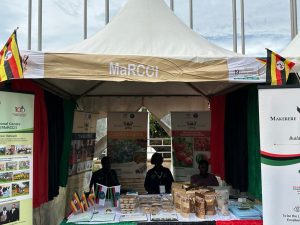The 19th Annual General Meeting (AGM) of the Regional Universities Forum for Capacity Building in Agriculture (RUFORUM) recently concluded, leaving behind a trail of insights, collaboration, and knowledge-sharing in the pursuit of advancing sustainable agriculture and higher education across Africa. Hosted from October 28th to November 2nd, 2023, in Yaoundé, Cameroon, the event brought together educators, researchers, policymakers, and stakeholders to explore innovative solutions to the challenges facing the continent.
Under the overarching theme, “Transforming Higher Education to Sustainably Feed and Create Prosperity for Africa,” the 19th RUFORUM AGM offered a platform for thought leadership and collaboration. Experts and participants engaged in discussions, plenary sessions, and panel conversations aimed at promoting sustainable agricultural practices and advancing higher education in Africa.
Here are some key takeaways from MARCCI’s participation:
- Capacity Building Excellence: MARCCI’s presentations by the Executive Director Dr. Richard Edema on capacity building resonated strongly with the AGM’s audience. The center’s dedication to nurturing talent and knowledge in agriculture is pivotal in addressing the continent’s agricultural challenges.
- Student research and poster presentation: The poster presentations by students supported by; Makerere University Regional Center for Crop Improvement(MARCCI), the Department of Agricultural Production and The College of Agricultural and Environmental Sciences with funding from Seed Systems Group and The World Bank through the ACE2 project number. All students were engaged in an oral presentation of their posters to the different institutional leaders and participants to pick their insights oh how to improve and go further with their research. This reflects MARCCI’s commitment to supporting the next generation of agricultural leaders and improving food security in Africa.

Some of the topics for the student’s research included;
- Distribution of Blight Diseases of Tomato in selected Agro-ecological Regions of Uganda – Akello Lydia
- Investigation of the sweet potato breeding trial network for efficient and cost effective Variety development in Uganda – Chelangat Doreen
- Genetic dissection of yam (Dioscorea app.) genetic resources in Uganda for resistance to mosaic virus disease – Toyin Osho
- Optimization of NIRS Models for genetic studies of Cowpea grains cooking quality
- Association Mapping of Genomic Regions for Resistance to Sorghum Anthracnose Disease in Uganda – Mukashema
- Sources of Cowpea Resistance to Flower Bud Thrips in Uganda – Hellen Wairimu Gitonga
- Association mapping for resistance to Turcicum Leaf Blight (Exserohilum Turcicum) in Sorghum – Kwenyu S.V
- Genetic analysis of Antinutritional factors in Soybean (Glycine Max) – Noberto Jose Palange
- Genome-wide identification of loci for protein digestibility in Sorghum multi-parent advanced generation inter-cross(MAGIC) population – Habiba Nalule
- Protein and Iron composition and stability of selected Cowpea MAGIC Population lines in Uganda – Nandege Lenna
- Climatic parameters and fertilizer input influenced Sorghum yield trends in Uganda (1961-2020) – Afang Badji
- Bio chemicals associated with soybeans resistance to groundnut leaf miner infestation – Ibanda A
- Value Addition Empowerment: MARCCI’s exhibition of value-added products, derived from cowpea and sorghum, demonstrated the potential for enhancing the economic prospects of farmers. Value addition is a crucial element in agricultural development.

MaRCCI Staff at the Exhibition centre - Digital Solutions for Agriculture: The live demonstration of MARCCI’s Production Guide Mobile Application and 2D animations for Cowpea and Sorghum highlighted the transformative role of technology in modern agriculture. Digital solutions provide invaluable guidance and knowledge to farmers.
Some of our Key takeaways from the 19th RUFORUM AGM encompass a range of critical areas in advancing agricultural development in Africa. These include a strong emphasis on capacity building as a cornerstone for nurturing talent and knowledge in the agriculture sector, the resounding call to invest in research and innovation to address pressing agricultural challenges, support for youth and women as key drivers of change in the field, the essential role of encouraging innovations to modernize agriculture, and the significance of fostering partnerships to collectively drive sustainable agricultural practices and elevate higher education in the region. These takeaways collectively serve as guiding principles for shaping the future of agriculture in order to ensure food security in Africa.
